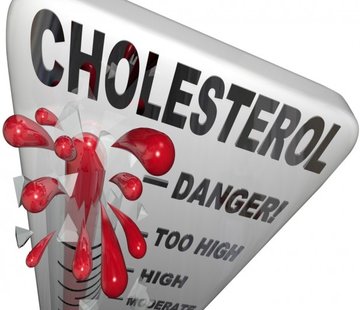
Cholesterol today is a household word. It has been deemed the root cause for just about every case of heart disease in the last 2 decades. As such almost everyone today is cholesterol-fearing. Nearly everyone I know parrots about it demonizing it, completely ignorant to the fact that without it, they would just not be! Worse still, the half-baked knowledge about Cholesterol has been instrumental in demonizing a variety of foods. “Eggs and saturated fat anyone?”
“Gosh no! I don’t want to bleed cholesterol.”
That’s the problem right there! The belief today is to keep it as low as possible or suffer the consequences. But what if cholesterol wasn’t in fact the cause of all evil? What if in fact it was essential to one’s health?
the What ?
The word Cholesterol has Greek roots, not unlike many others. Cholesterol is an organic molecule synthesized by all animal cells. It is a soft, white, waxy substance that is found in every single cell of your body i.e. vital! It’s made up of lipids, which are molecules of fat. Typically the body produces about 1 gram of cholesterol daily and the body’s content of cholesterol at any given time is approximately 35g.
A vast majority of the body’s cholesterol requirement is accounted for by self-production. The body titrates the production against that ingested in food. So if foods high in cholesterol are ingested, the body’s own production falls to accommodate this. In addition to producing cholesterol the body recycles it as well. This means that cholesterol excreted from the liver into the digestive tract is re-absorbed in the small bowel back into the blood stream for reuse. This is
the case with approximately 50% of the body’s cholesterol. The remainder is excreted in faeces.
The cholesterol made by plants is different to that made by animals. These are called Phytosterols and when ingested, compete in the small bowel with animal cholesterol for absorption thereby potentially lowering the recycling efficiency. However when the small bowel absorbs Phytosterols, they are then re-excreted back into the GI tract.
the Why ?
Cholesterol serves several functions within the body.
Bottom line – Cholesterol IS essential and NOT evil !
the problem ? Is there one ?
As it is with any other commodity, so it is with cholesterol; moderation is key! Excessive cholesterol is bad, just like excess sugar is bad Sweet Sorrow [Part 1].
Conventional medicine will tell you that there are good fats and bad fats. The good fats are commonly referred to as HDLs or High Density Lipids and the bad fats are LDLs or Low Density Lipids. Physicians and nutritionists have engrained it into our psyche that LDLs cause strokes, heart attacks and obesity. They deposit on the insides of our blood vessels causing narrowing (this is medically termed ‘atherosclerosis’) and et voila – blockage which if in the heart equals ATTACK!
What are HDLs and LDLs ? They are fats that combine with proteins so that they can be transported in the bloodstream; fat and water doesn’t mix and so fats on their own can’t travel in the blood. LDL and HDL are forms of proteins and are far from being just cholesterol. LDL particles come in many sizes and large LDL particles are not a problem. Only the so-called small dense LDL particles can potentially be a problem, because they can squeeze through the lining of the arteries and if they oxidize, otherwise known as turning rancid, they can cause damage and inflammation.
To obtain levels for the various fats and cholesterol, a lipid profile test is done and typically if LDLs and Cholesterol is high, medication and treatment is ensured to prevent heart disease. However there is increasing evidence to suggest that these numbers don’t accurately predict heart disease incidence and occurrence and increasingly the HDL percentage and Triglycerides to HDL ratio is being taken into account.
If your arteries are damaged, a very similar process occurs inside of your body, except that a "scar" in your artery is known as plaque. This plaque, along with the thickening of your blood and constricting of your blood vessels that normally occur during the inflammatory process, can indeed increase your risk of high blood pressure and heart attacks. Notice that cholesterol has yet to even enter the picture. Cholesterol comes in because, in order to replace your damaged cells, it is necessary.
Because high levels of Cholesterol were found in sites of arterial inflammation it came to be factual that high cholesterol was the cause of heart disease. As a result, the Western developed world made radical changes to their diets by cutting out butter, red meats, animal fats, eggs and replacing them with more processed grains, more vegetable oils, and more high-fructose corn syrup, all of which are nutritional disasters. This “low fat diet” became the cause for the epidemic of Obesity and Diabetes in the modern world both of which lead to increased inflammation in the blood vessels and therefore cholesterol increase in the body.
There are other factors too which result in the inflammation being discussed here. These include:
the What to do
Now just because cholesterol seems suddenly less ‘evil’ doesn’t mean one can gorge on saturated fatty foods without a care in the world. If your calorie intake exceeds that which you burn then fat and weight gain is inevitable and obesity in turn is the root cause of infinite health disorders and diseases.
What it simply means is that one needs to be aware of what are the risk factors and take measures accordingly.
the What nots
If you are determined to have high levels of cholesterol do NOT :

Juggling many roles from physician to writer to pilates instructor to Marketing-PR executive, Dr. Daamini is constantly pushed and inspired to get creative on how to encompass a Retreat into her daily life.
View Profile